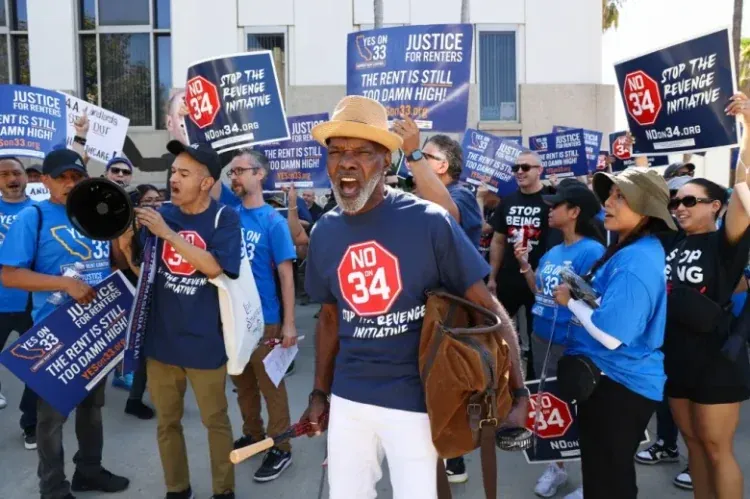From CalMatters politics intern, Jenna Peterson:
About 300 rent control advocates gathered in downtown Los Angeles amid a scorching heat wave. They passionately expressed their discontent by chanting, “The rent is too damn high!” The crowd was accompanied by two 10-foot puppets portraying “greedy landlords,” adding a touch of theatricality to the protest.
Advocates from various organizations, such as the AIDS Healthcare Foundation and UNITE HERE Local 11, expressed their support for Proposition 33 and opposition to Prop. 34. These propositions will be determined by California voters in November. It is worth noting that similar rent control propositions were rejected by voters in 2018 and 2020. However, advocates remain optimistic that this year’s outcome will be distinct.
Proposition 33 aims to grant cities the authority to implement rent control measures, a power that is currently restricted for single-family homes and apartments constructed after 1995. Consequently, renters like Nallely Gomez, who serves as an organizer for UNITE HERE Local 11, express concerns over the annual escalation of their rental costs.
-
- Gomez: “My rent literally went up $149 yesterday. Everyone who works here should be able to live here.”
Proposition 34 may not seem directly related to rent control or the requirement for healthcare providers in California to allocate 98% of their revenue from a federal discount prescription program towards direct patient care. However, this measure, backed by the California Apartment Association, appears to specifically target the AIDS Healthcare Foundation. The foundation utilizes some of these funds for rent control initiatives and other forms of political advocacy.
According to Susie Shannon, the campaign manager for Yes on 33, Proposition 33 and Prop. 34 are closely connected.
-
- Health tax measure: Other than Gov. Gavin Newsom raising concerns about taking away budget flexibility, there hadn’t been real opposition to Prop. 35, which would require the state to spend money from a tax on health plans on Medi-Cal and is backed by California’s health care industry. That changed Thursday with the launch of a coalition that includes advocacy groups for children, seniors, good government and health care access. They say that the measure would roll back investments in community behavioral health, Alzheimer’s services and other programs. “Prop. 35 throws away the hard work communities have done to make health care more equitable,” Kiran Savage-Sangwan, executive director of California Pan Ethnic Health Network, said in a statement.
-
- Asian American voters: A new study being released today by several advocacy groups says that three-quarters of California’s Asian American voters are absolutely certain they will vote in November, but 46% of those surveyed have not been contacted by either major political party. The report suggests that Democrats may have the best chance: 43% identify with the party, compared to 19% Republican. And there are quite a few potential Asian American voters in California: 4.5 million — nearly a third of all eligible Asian voters in the U.S. The report also says that the top policy priorities are the economy, health care and inflation.
Check out our Voter Guide, which includes essential information and videos about all 10 propositions. Stay up to date with CalMatters’ election coverage by subscribing to our 2024 election emails. Don’t forget to explore the rest of our Voter Guide, where you’ll find a comprehensive FAQ section on how to vote.
Every Thursday, journalist Deborah Brennan from CalMatters brings you the latest updates and highlights from the Inland Empire. Stay informed and sign up for her newsletter to receive all the important stories from this region.


